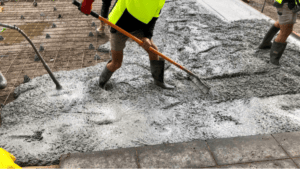Griffith Uni: Zeotech’s manufactured zeolites are actually multi-pronged greenhouse gas mitigators

Zeotech is focusing on landfill methane mitigation and calculating fertiliser GHG offsets for its zeolites. Pic: via Getty Images
Zeotech’s zeolites have been found to have multiple opportunities to mitigate greenhouse gases, according to a study by Griffith University.
The three-month Extended Carbon Market Scoping Study found seven additional ways in which zeolites manufactured using Zeotech’s low-cost proprietary mineral processing technology could mitigate carbon dioxide, methane and nitrous oxide.
Zeotech’s (ASX:ZEO) has now engaged Griffith to prepare a targeted proposal to further investigate the commercial prospects of two high-potential opportunities in landfill methane mitigation and calculating fertiliser GHG offsets.
“Griffith’s extended carbon markets scoping study confirms manufactured zeolites have the potential to play a significant role in materials-based greenhouse gas mitigation,” Griffith University School of Environment and Science senior lecturer Dr Chris Pratt said.
“Methane emissions remain a critical sustainability challenge and working on developing zeolite centric solutions to achieve this is an exciting and important opportunity.”
“The team at Griffith has also commenced the soil carbon trials, which form part of Zeotech’s agricultural product development program, and we look forward to further investigating GHG mitigation solutions utilising Zeotech’s low-cost manufactured zeolites.”
Zeotech managing director Peter Zardo added that the company had taken a portfolio approach in developing opportunities that leverage its proprietary mineral processing technology to address sustainability challenges.
“I recently met with the team at Griffith on campus and feel confident the capabilities and expertise we have on our projects will deliver on Zeotech’s objectives and enable the Company to make a tangible contribution in developing GHG mitigation solutions,” he added.
Selected opportunities
Methane is the second most significant greenhouse gas with a 100-year global warming potential 28 times greater than CO2.
Landfills are a major source of methane, generating just under 1 gigatonne of atmospheric CO2 equivalent per annum.
An active manufactured zeolite layer to cover soils could offer ideal habitats for a group of bacteria termed ‘methanatrophs’ that consume methane and oxidise it into water and CO2, which has a lower global warming impact.
Manufactured zeolites also exhibit exceptionally effective CH4 oxidation potential and could be applied to landfill cover soils with research indicating only very thin layers are required.
Meanwhile, chemical fertiliser production is one of the most greenhouse gas emission intensive processes globally with food production responsible for about a quarter of global emissions.
A lot of nitrogen fertilisers applied to soil is wasted with plant uptake as little as 35% while the remainder is leached into waterways or is broken down by microbes in the soil – releasing nitrous oxide.
Nitrous oxide is the third most significant gas with a global warming potential even higher than methane (265 times greater than CO2).
The unique properties of zeolite could allow them to serve as nitrogen-carrying, slow-release fertiliser.
Griffith’s research will determine whether there is an emissions benefit to granulating the company’s manufactured zeolite with conventional fertilisers to offer a more effective, efficient, and sustainable platform for plant nutrient delivery.
The proposed research aligns strongly with the existing dual-stream program and would seek to establish the carbon footprint of a potential Zeotech agri-product compared to conventional fertiliser applications.
This article was developed in collaboration with Zeotech, a Stockhead advertiser at the time of publishing.
This article does not constitute financial product advice. You should consider obtaining independent advice before making any financial decisions.
UNLOCK INSIGHTS
Discover the untold stories of emerging ASX stocks.
Daily news and expert analysis, it's free to subscribe.
By proceeding, you confirm you understand that we handle personal information in accordance with our Privacy Policy.








